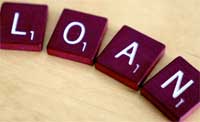Loans are necessary whether you’re paying for college, starting a business, or doing something far less demanding. However, it isn’t just one size fits all when it comes to loans. There are a variety of different types of lending options for each situation. Some of them are better than others, so here’s an explainer of what types of loans are out there.
Personal Loans
Personal loans are probably the most common. This is the type you always see in movies, where the borrower goes to a bank in hopes of being approved for a loan. These can be used for as number of different things, such as renovating your kitchen or buying a new car.
These are most often unsecured, meaning that you don’t need to put down any collateral to receive the loans. Your credit score determines the interest rate you pay and the amount you receive. If you have a history of failing to make payments, you might not be approved. If you are approved, the interest rate will probably be in the double digits.
It’s not just banks that offer these types of loans, as there are online services that often offer better rates.
College Loans
College loans are typically a mix of personal loans from private lenders and federal loans. The rates on the federal are typically much lower than their private counterparts, and the penalties for not paying them off are less harsh. In most cases, it’s better to go with federal loans than private personal loans, but in most cases the federal loans aren’t enough to cover tuition and other expenses.
Credit Cards
Most people don’t think of a credit card as a loan, but that’s exactly what it is. Each time you use a credit card, you’re essentially being loaned money that’s expected to be paid off when the monthly bill is due. Of course, credit card companies don’t mind if you’re not in a hurry to pay off your balance.
Interest rates are high if you’re missing your payments, but that’s the price of convenience. Qualifying for a credit card is far easier than just about any other type of loan.
Mortgage Loans
Going through all the types of mortgages would require another couple articles. Whether you go with fixed rate, variable rate, or something else, all these types of mortgages allow someone to purchase a house and move in. While the homeowners name is on the deed, the house is collateral for the loan. If the borrower falls behind in payments, the lender is legally allowed to reclaim the house and sell it to somebody else. This is called a foreclosure.
One of the biggest negative effects of the financial crisis of 2008 was that many homeowners were foreclosed upon for being unable to make their payments. Banks were stuck with more homes than they could care for, further impacting the economy.
The effects of the financial crisis are still being felt, but things have stabilized since the worst of it and interest rates remain low for borrowers. Some loans take 30 years to pay off, others are 15 years and some strict loans penalize you if you pay too much in the hopes of paying off your mortgage early.
Payday Loans
Payday loans, also known as payday advances, are expensive products that often cause poor people to be poorer. How it typically works is that, in case of an emergency, you write a payday loan company a check for a few hundred dollars and an additional fee (often around $40). You’re then given the cash and have a short amount of time – often a week or two – to pay off the loan before high interest rates kick in. Some states have adopted laws to curb these high interest rates, as people can find themselves trapped in an endless cycle of indebtedness.
Before considering a Payday loan, if you need money now then why not check out a list a friend put together of some need money ideas?
Understanding the Different Types of Loans – Conclusion
There’s a loan for almost every situation, and each one has its own benefits. Regardless of what loan you need, be sure to do some research to find the best rates. This could save you a lot of money.
Anum Yoon is a personal finance blogger and writer. She created and maintains her personal finance blog Current on Currency. You can subscribe to her blog newsletter right here for her weekly updates.









My house is paid off but I have an open Equity line of Credit open against it in the event I NEED to borrow money for something unforeseen or planned for beyond my emergency fund. It definitely fits into your Mortgage Loan definition other than I can take any amount small or large up to its limit.